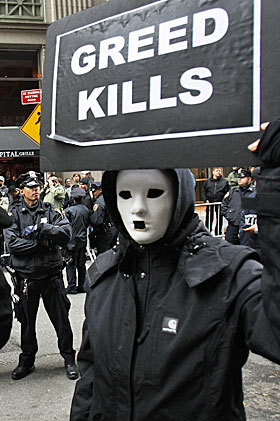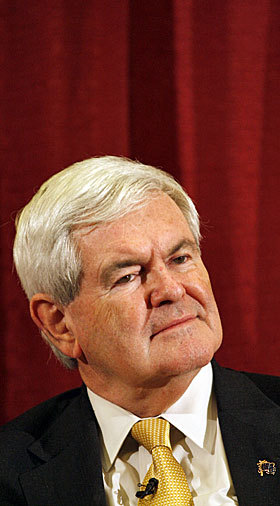A few weeks ago, on my way to the office, I was basically shoved off the sidewalk by a cranked-up throng of several hundred Occupy Wall Streeters.
They spent the rest of the day barging around downtown Washington, blocking traffic and desperately trying to attract the sort of coverage they'd commanded just a few months earlier.
That evening, they ended up in a public square near the National Press Building here, chanting in the driving rain of a December night, with nary a soul paying the slightest attention.
Occupy Wall Street, with its message that Wall Street is something approaching a criminal enterprise, was among the freshest and most intriguing political developments of 2011.
 |
| The Occupy movement may have gone to ground with the cold, but who will bet against its resurrection in the presidential race? |
But its utopian pursuit of participatory democracy — D.C. Occupiers spent hours debating whether to accept a free Thanksgiving dinner from a local interfaith group (some of them had issues with participating in a celebration of consumption) — rendered it incapable of articulating any single strategic goal.
But make no mistake. While OWS might be disappearing from America's parks and civic squares, the anger it tapped into is still there, and just as powerful.
The Occupy movement may have gone to ground with the cold, but who will bet against its resurrection in the presidential race?
"Wall Street," and, yes, "capitalism" have actually become dirty words in broad swaths of America. When you consider how this country was built and what it stands for in the world, that amounts to secular apostasy.
Republicans worried
Almost certainly, this class struggle — the term might sound tired and doctrinaire, but that's what it is — will define the 2012 campaign for Congress and the White House.
Republicans are particularly worried. One of their chief strategists is now telling candidates to avoid using the word capitalist altogether.
It's not difficult to see how this happened. The only puzzling thing is that it's taken three years.
Uncontrolled, cynical corporate greed nearly destroyed the American economy in 2008, impoverishing millions of homeowners, dissipating people's life savings and throwing millions of others out of work.
The government, whose "regulatory" agencies allowed this to happen, then stepped in and rescued the culprits, rather than their victims, using tax money.
A lot of people here saw that as socialism, although George W. Bush tried hard to portray it as something else, haplessly describing himself as "a market guy" even as he stepped in to thwart market forces with their so-called creative destruction. You didn't hear any of the usual survival of the fittest bombast from Wall Street that day, either.
With trillions in bailout funds and bank capitalizations in hand, "the street's" rugged individualists then proceeded not to lend the money, as intended, but to invest it for themselves in the equity markets.
Their happy days of bonuses, Ferraris and exotic timepieces returned within months, while the misery of middle America continues to this day.
'Weapons of financial destruction'
Fraud was unquestionably committed. Several firms have admitted as much.
Wachovia Bank, now owned by Wells Fargo, recently settled with the Justice Department, "admitting, acknowledging and accepting responsibility" for years of illegally manipulating bidding on derivatives.
Called "weapons of financial destruction," derivatives greatly amplified the 2008 crisis, and led to the biggest bailout of all when the insurance giant AIG failed.
But are any of the Wachovia manipulators heading for prison? Nope. The company is paying $148 million to the feds, the equivalent of a good bonus year. In fact, in a settlement of the same case with another government agency, the Securities and Exchange Commission, Wachovia paid up "without admitting or denying the allegations."
Such is Wall Street's freedom to shear the sheep. A company can commit outright fraud, pay a relatively trifling fine, admit guilt to one government agency, and deny culpability to another.
This pattern has repeated itself in case after case. The U.S. government, afraid of damaging the financial system, settles for a big fine, which it usually keeps for itself, in agreements that often immunize against any further legal action by the poor saps who fell for these crooked pitches in the first place.
But the saps are now really, really angry. And looking for a reckoning.
 |
| Newt Gingrich, the Republican who is scared of capitalism, columnist George F. Will called him. Gingrich's opponent for the Republican nomination, Michele Bachmann, meanwhile called him the epitome of crony capitalism, an epithet she also applied to contenders Mitt Romney and Rick Perry |
'We've got a problem'
Today, Americans appear to be realizing that the capitalist system they were raised to believe in with almost religious devotion is gamed — that all the stories about how anyone can get rich through hard work and thrift are just part of a national myth.
Newt Gingrich, the Republican who is scared of capitalism, columnist George F. Will called him. Gingrich's opponent for the Republican nomination, Michele Bachmann, meanwhile called him the epitome of crony capitalism, an epithet she also applied to contenders Mitt Romney and Rick Perry.
That anger is now turning into a political buzz saw. Heaven help the political party that becomes the proxy for the predations of Wall Street and capitalism in general.
The Republicans, who have done their best to strangle congressional attempts at stricter financial regulation, know they're a prime candidate for that title.
"I'm frightened to death," Republican strategist Frank Luntz told the Republican Governors' Association in November.
The Occupy Wall Street protesters, he said, "are having an impact on what the American people think of capitalism."
Citing his own polling, Luntz is actually advising Republican candidates to avoid even uttering the word "capitalism" during the 2012 general election campaign (he advises "economic freedom" instead).
Think about that: a conservative strategist, advising politicians to avoid saying "capitalism" in the United States of America.
The American public "still prefers capitalism to socialism," Luntz said, "but they think capitalism is immoral.
"And if we're seen as defenders of quote, Wall Street, end quote, we've got a problem."
Hard times
The question of whether capitalism has failed ordinary Americans will "set the terms of the debate for the 2012 election," Columbia University Prof. Thomas Edsall wrote recently in the New York Times.
With the first of the presidential primaries about to begin, both parties are scrambling to get hold of that loose buzz saw and use it as a weapon.
President Barack Obama has begun emphasizing the widening gap between haves and have-nots in America, seeking to harness middle-class despair. Republicans are searching hard for a counter-message.
But it is increasingly clear that conservatives can no longer rely on an unquestioning, bedrock faith in capitalism.
Unshackling free enterprise has been a core value of the Republican Party for more than a century. Its leadership candidates, like Mitt Romney, are still declaring that "people achieve success through hard work, education, risk taking."
The problem is, too many Americans now not only want to see some of Wall Street's capitalists shackled, but serving hard time.
Source URL